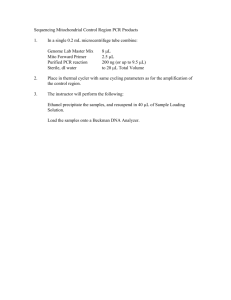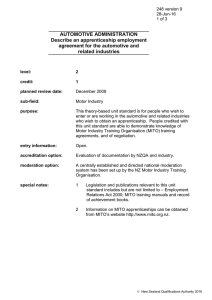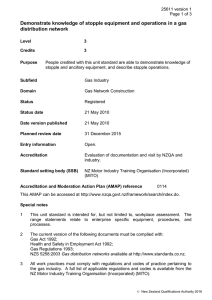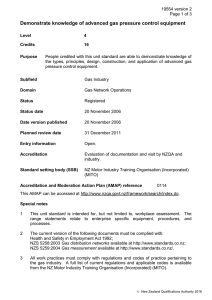OF THE NZ MOTOR INDUSTRY TRAINING ORGANISATION (INC
advertisement
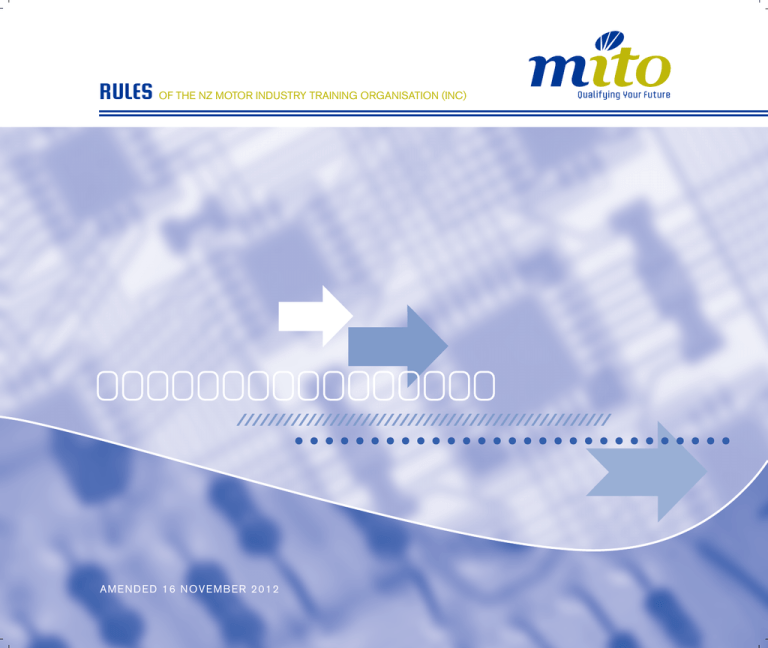
RULES OF THE NZ MOTOR INDUSTRY TRAINING ORGANISATION (INC) A MENDED 16 NOVEMB ER 2012 RULE 1: NAME 1.1 The name of the society is the “NZ Motor Industry Training Organisation (lnc)”. The shortened name is “MITO”. RULE 2: MISSION 2.1 MITO improves the productivity and performance of the industry groups we serve by identifying and meeting their current and future skill development needs to international standards. RULE 3: OBJECTS 3.1 MITO is recognised under the Industry Training Act 1992 as the Industry Training Organisation for the motor, industrial textile fabrication, road transport, passenger services, warehousing and logistics, ports and stevedoring, extractive, gas, drilling, galvanising, petrochemical, energy and chemical plant, blaster coating and resource recovery industries (“the Industry”). In accordance with this legislation, MITO is established for the purpose of adding value to New Zealand’s tertiary education system and the specific industry groups we serve by delivering cost-effective services along the industry training value chain. 3.2 MITO’s specific objects are: 3.2.1 To identify the current and future skill needs of the industry groups we serve as part of a strategic planning cycle undertaken in partnership with our stakeholders 3.2.2 To develop effective Strategic Training Plans that meet industry skill needs in a way that ensures our stakeholders are committed to their successful implementation 3.2.3 To implement Strategic Training Plans in partnership with our stakeholders in a manner that ensures we achieve our shared objectives, regularly reviewing and updating our plans as needs and circumstances change 3.2.4 To establish skill standards by developing and quality assuring nationally recognised qualifications that are benchmarked against internationally respected industry standards 3.2.5 To promote industry training in a manner that attracts high-quality people to the workforce and builds the capability of that workforce to meet current and future industry needs 3.2.6 To facilitate education and training delivery through customised arrangements to consistent quality standards that enable our learners to achieve their learning goals 3.2.7 To assess trainee competency through appropriate and relevant assessment processes that meet standards consistent with awarding national qualifications. 3.3 MITO may engage in all activities that further or promote its objects including: 3.3.1 Providing effective organisational leadership, with governance and management arrangements that reflect our commitment to being a good employer, and effective planning and decision making that ensures our financial health and meets our stakeholders’ needs 3.3.2 Developing organisational capability through our people, systems, processes, infrastructure and partnerships 3.3.3 Borrowing, raising or securing the payment of money for the purposes of MITO in such amounts and on such terms as MITO may think fit and in particular by the issue of mortgages, charges or other securities charged upon all or any of the real or personal property of MITO and to purchase, redeem or payoff any such securities 3.3.4 Employing the profits of the operations of MITO to furthering the objects of MITO in accordance with these Rules 3.3.5 Doing all such lawful acts and things as are incidental or conducive to the attainment of MITO’s objects. RULE 4: MEMBERSHIP 4.1 There shall be two (2) categories of membership as follows: 4.1.1 Contributing Membership Contributing membership shall be available to those industrial unions of workers and associations of employers which represent in whole or part the interests of the Industry in New Zealand. All Members in this category have voting rights. 4.1.2 Subscribing Membership Subscribing membership shall be available to those limited liability companies, corporations, professional bodies, sole traders, tertiary education organisations and individuals which have an interest in the Industry. This membership category does not have voting rights. 4.2 All Members must comply with the Rules of MITO and any of its policies and procedures. 4.3 The title of Honorary Associate may be conferred on any person in recognition of outstanding services rendered to MITO. An Honorary Associate shall be nominated only by the Board and shall be elected only at an Annual General Meeting of MITO. Honorary Associates do not have voting rights. RULE 5: APPLICATION FOR AND ELECTION TO MEMBERSHIP 5.1 Application for membership of MITO shall be made on the prescribed form to the Chief Executive of MITO. 5.2 The Chief Executive shall submit all applications to the Board at the next Board Meeting. The Board shall be empowered to accept or decline any application at its sole discretion and in doing so shall take into account Section 7 of the Industry Training Act 1992. The Board may, but is in no case obliged to, give any reason for the rejection of an applicant. 5.3 Any applicant declined under Rule 5.2 may, by notice in writing to MITO received no later than fourteen (14) days after the decision of the Board, request a review of the Board’s decision at the next Annual General Meeting of MITO. The decision of the Annual General Meeting shall be final and the Board is not obliged to give any reason for its decision. 5.4 The rights and privileges of every Member of MITO shall be personal to that Member and shall not be transferable either by the Member’s own act or by operation of law. RULE 6: TERMINATION OF MEMBERSHIP 6.1 Any Member may, at any time, resign from MITO by giving notice in writing to the Secretary, provided that such Member shall be liable for and required to pay any subscription or other payment which may be due from the Member and is unpaid at the time of resignation. 6.2 The membership of any Contributing Member or Subscribing Member who has failed to pay their annual subscription within 20 days of it falling due may be terminated by the Board, provided that such Member shall be liable for and required to pay any payment which may be due from the Member and is unpaid at the time of termination. 6.3 The Board may terminate the membership of any Member who, in its opinion, has failed to observe these Rules or any Rule or regulation made pursuant to these Rules or whose conduct in any respect has been derogatory to the character or prejudicial to the interests of MITO. 6.4 If the membership of any Member has been terminated in accordance with Rule 6.2 or 6.3 above that Member may, within fourteen (14) days of termination, require the Secretary to call a Special General Meeting to review the Member’s termination. The decision of the Contributing Members at the Special General Meeting shall be final. RULE 7: SUBSCRIPTIONS 7.1 The annual subscription payable by Contributing Members and Subscribing Members shall be set by the Board and shall be subject to approval by Contributing Members at an Annual or Special General Meeting. For the avoidance of doubt subscription rates may vary between Members within each category of membership at the discretion of the Board. 7.2 All annual subscriptions shall be due and payable for each calendar year on or before 20 March in every year. 7.3 That until a change in subscriptions is approved at an Annual or Special General Meeting the subscription already fixed shall remain in force. 7.4 New Contributing and Subscribing Members shall pay their subscriptions, on a pro-rata basis, immediately upon the Board’s acceptance of their application for membership. RULE 8: STRUCTURE AND ADMINISTRATION 8.1 The affairs of the business, administration and management of MITO shall be vested in the Board. The Board shall have no power of sale, merger, amalgamation or any other form of disposal of the business, undertaking or assets of MITO without obtaining the prior approval of a majority of Contributing Members. 8.2 The Board shall consist of: (a) One representative from at least three (3) and up to six (6) of the following entities so long as they are and remain a Contributing Member: • • • • • • Motor Trade Association; Motor Industry Association; New Zealand Collision Repair Association; Outdoor Fabric Products Association of New Zealand; Road Transport Forum NZ; and Bus and Coach Association New Zealand. (b) One representative from the Institute of Quarrying New Zealand and one representative from the Aggregate and Quarry Association of New Zealand so long as they become and remain Contributing Members; (c) One representative from the New Zealand Amalgamated Engineering, Printing and Manufacturing Union; and (d) Two (2) independent persons appointed by Board Members in accordance with subclauses 8.2 (a), 8.2 (b) and 8.2 (c). 8.3 Contributing Members identified in Rule 8.2 above shall notify the Secretary in writing of the representative they will be appointing to the Board by 28 February in every year and of any changes to that appointment as and when necessary provided that where a Board Member has been removed in accordance with Rule 10.5, such person shall not be eligible for reappointment to the Board. 8.4 The Board shall appoint one of the two independent persons to be Chairperson of the Board and may appoint one other Member of the Board to be Deputy Chairperson of the Board. 8.5 The Board shall appoint a person to be the Chief Executive of MITO. The Chief Executive will be directly responsible to and under the control of the Board for the general and financial administration of MITO and shall have such duties and responsibilities as set by the Board. 8.6 The Chief Executive shall be appointed as Secretary of the Board but shall not be allowed to vote. 8.7 The Secretary shall keep a register of all Members at the registered office of MITO. Members shall notify the Secretary of any change of name or change of address of the Member. The register shall be open to inspection during normal office hours by any Member of MITO. The register shall be conclusive evidence as to all matters relating to membership. 8.8 The Secretary shall give notice of meetings, keep minutes of meetings and keep all records including financial records of MITO. Subject to law, the Secretary shall upon request at any time by a Contributing Member, provide reasonable access to all information and records including financial records of MITO. 8.9 The Board may, at any time, review the make-up of the Board having regard to all relevant matters, including MITO training volumes, the MITO membership base and general governance best practice. Any recommendation of the Board arising from such a review may be put to the Contributing Members at a General Meeting as a resolution to amend these Rules as they relate to the appointment of Board Members. Nothing in this Rule shall limit any right or power that the Board has. RULE 9: THE BOARD 9.1 The Board shall meet as and when required to carry out the business of MITO. Not less than fourteen (14) days notice in writing of each meeting of the Board shall be given by the Secretary to each Board Member, including on the notice of meeting an indication of the business to be tabled before such meeting. 9.2 Meetings of the Board may be called by: (a) the Chairperson or in his or her absence, the Deputy Chairperson; or (b) the Chief Executive when requested to do so by not less than three Members of the Board. 9.3 A majority of the Board, including the Chairperson or Deputy Chairperson shall constitute a quorum of the Board for the transaction of business. 9.4 The Board shall take all such steps as are necessary to further the objects of MITO and shall do all such other things as are provided for under the Rules. 9.5 At all meetings of the Board, each Member shall have one vote. The Chairperson of the Board (or in his or her absence, the Deputy Chairperson) shall have a casting vote in the event of an equality of votes. 9.6 If, in relation to any motion to be voted on by the Board, any Board Member is a party to, or will or may derive a material financial benefit from any financial transaction that would follow from the motion, that Board Member is deemed to have a material interest in the transaction and must declare that interest to the other Board Members on the Board prior to any vote on the motion. The noninterested Board Members must then decide in their absolute discretion (but having regard to the no Member benefits in Rule 16.9) whether or not to exclude the interested Board Member from the vote on the motion in which he or she is interested. Any declaration of interest must be recorded in the minutes of any meeting. 9.7 Any meeting of the Board may be held by the Board Members who constitute a quorum, being assembled together at the place, date and time appointed for the meeting or by means of audio, or audio and visual, communication by which all Board Members participating and constituting a quorum can simultaneously hear each other throughout the meeting. RULE 10: BOARD MEMBERS 10.1 If, through early retirement or any other cause, the number of representative Contributing Members on the Board falls below three (3), the Board shall with urgency request that a replacement Board Member is appointed in accordance with the provisions of Rule 8.2. The Board shall still have power to act until a substitute Board Member or Board Members are appointed under this Rule. 10.2 MITO may pay Board Members’ fees provided that the exemptions from Income Tax in Section CB 4(1)(c) and (e) of the Income Tax Act 1994 are not infringed. 10.3 The Board Members shall perform their obligations to a professional and competent corporate standard. 10.4 No person may hold office as a Board Member of MITO if that person: (a) is under 18 years of age; (b) is an undischarged bankrupt; (c) is convicted of any crime involving dishonesty as defined in section 2(1) of the Crimes Act 1961; (d) is subject to a property order made under section 30 of the Protection of Personal and Property Rights Act 1988; (e) is a person who is prohibited from being a director or promoter of or being concerned or taking part in the management of a company under section 382 or section 383 or section 385 of the Companies Act 1993. 10.5 If the Board decides in its absolute discretion that the conduct of any particular Board Member has been derogatory to the character of or prejudicial to the interests of MITO, then the remaining Board Members may by way of unanimous vote remove that Board Member from the Board. 10.6 If a Board Member has been removed from the Board in accordance with Rule 10.5, then that Board Member may within fourteen (14) days of his or her removal, require the Secretary to call a Special General Meeting to review the Board Member’s removal from the Board. The decision of the Contributing Members at the Special General Meeting shall be final. 10.7 The two Board Members appointed by the Institute of Quarrying New Zealand and the Aggregate and Quarry Association of New Zealand under Rule 8.2(b) (the EXITO Board Members) shall hold office until the Annual General Meeting to be held between 1 January 2014 and 30 April 2014. If for any reason one or both EXITO Board Members resigns or is removed as a Board Member, under Rule 10.5 the Institute of Quarrying New Zealand or the Aggregate and Quarry Association of New Zealand (as the case may be) shall have the power to appoint a replacement until the AGM referred to above. RULE 11: COMMITTEES 11.1 The Board shall have the power to appoint Committees consisting of Board Members for such purposes as it shall see fit and to delegate to such Committees such power and authority as the Board shall deem advisable. RULE 12: MEETING OF MEMBERS 12.1 An Annual General Meeting of MITO shall be held no later than 30 April in each year at such time and place as the Board may determine. The Secretary shall give each Member at least twenty-eight (28) days notice in writing of the meeting. 12.2 Those entitled to attend an Annual General Meeting shall be: 12.3 (a) The Members of the Board; and (b) Representatives appointed by Contributing Members limited to one representative and up to three observers for each such Member; and (c) Representatives appointed by Subscribing Members limited to one representative and up to three observers for each such Member; and (d) Such other persons as the Board may from time to time determine. Each Contributing Member shall notify MITO in writing not less than fourteen (14) days prior to the date fixed for the Annual General Meeting of the name of the representative who has been appointed to represent that Member at the Annual General Meeting. 12.4 Special General Meetings may be called: (a) at the request of the Chairperson or in his or her absence, the Deputy Chairperson of the Board; or (b) upon the written request of not less than two (2) Members of the Board, or (c) upon the written request of not less than three (3) Contributing Members. The Secretary shall give at least fourteen (14) days written notice of the meeting to each Member within seven (7) days of receipt of the request. Such notice of meeting must include details of the business to be conducted. 12.5 A quorum for the transaction of business at an Annual or Special General Meeting shall be 75% of Contributing Members or their proxies present. If a quorum is not present within 15 minutes after the time appointed for the meeting, the meeting shall be adjourned to the same day in the following week at the same time and place or to such other date, time and place as the Board may appoint, and, if at the adjourned meeting a quorum is not present within 15 minutes after the time appointed for the meeting, the Contributing Members or their proxies present shall constitute a quorum. 12.6 If the Board fails to convene a Special General Meeting within thirty (30) days of the date of delivery of the request, the Members requesting the meeting may convene it themselves. In this situation four (4) Contributing Members shall constitute a quorum for the transaction of business. 12.7 The persons entitled to attend a Special General Meeting shall be the same as are entitled to attend the Annual General Meeting. 12.8 For the avoidance of doubt, at any Annual or Special General Meeting the only Members with voting rights shall be Contributing Members who shall vote through their representative. 12.9 Any Contributing Member may substitute a representative for a proxy to attend an Annual or Special General Meeting provided such Contributing Member notifies the Secretary in writing of the name of the proxy prior to the meeting. A proxy shall be entitled to vote on behalf of that Contributing Member. 12.10 Voting at all Annual and Special General Meetings shall be decided in the first instance on the voices. Unless a poll is demanded by the Chairperson or by any representative present, a declaration by the Chairperson that a resolution has been carried or carried by a particular majority or lost or not carried by a particular majority, an entry to that effect in the minutes of the meeting shall be conclusive evidence of the fact without proof of the number or proportion of the votes recorded in favour of or against such resolution. 12.11 If a poll is demanded it shall be taken in such a manner and at such time and place as the Chairperson of the meeting may direct and either at once or after an interval or adjournment or otherwise. The result of the poll shall be deemed to be the resolution of the meeting at which the poll was demanded. The demand for a poll may be withdrawn. The demand for a poll shall not prevent the continuance of a meeting for the transaction of any business other than the question on which a poll has been demanded. 12.12 In the case of an equality of votes, both on a show of hands and on a poll, the Chairperson shall have a casting vote. RULE 13: CHAIRPERSON 13.1 All Annual and Special General Meetings shall be chaired by the Chairperson, or in the absence of the Chairperson, by the Deputy Chairperson or in the absence of both, by any other person appointed at the meeting for the purposes of that meeting. RULE 14: STANDING ORDERS 14.1 MITO may by resolution passed at any Annual or Special General Meeting adopt Standing Orders to define the method of conducting or controlling all or any meetings, and the method of consideration of any business brought before any such meetings. 14.2 The Standing Orders shall only be amended, altered, added to, or rescinded in whole or in part at any Annual or Special General Meeting. 14.3 The Secretary shall give not less than fourteen (14) days notice in writing of any proposed alteration of the Standing Orders to Members. RULE 15: ADJOURNMENT 15.1 Any meeting may be adjourned as the Members present shall resolve. RULE 16: FINANCIAL 16.1 The financial year of MITO shall be 1 January to 31 December in each year. 16.2 The Chief Executive shall be responsible for keeping true and full accounts of moneys received and expended by MITO and of the assets and liabilities of the Board in proper books which shall be kept at its registered office or such other place as the Board thinks fit. 16.3 The Chief Executive shall, in each year present to the Annual General Meeting, an audited statement of the income and expenditure for the year and a balance sheet showing the financial position of MITO. Prior to the Annual General Meeting the Chief Executive shall send a copy of the audited financial statements to each Member of MITO. 16.4 The Chief Executive shall, on a regular basis as determined by the Board, submit to the Board for its approval a statement of the financial position of MITO. 16.5 All withdrawals of funds from MITO’s bank accounts shall be on cheques or orders or electronic transfers signed by any two persons duly delegated by the Board. 16.6 Subject to the provisions of the Incorporated Societies Act, the Board may from time to time to further the objects of MITO, raise or borrow such sums or sum of money as it may think fit, necessary or expedient with or without security and may secure the payment of such sums by mortgages or submortgages of any property real or personal belonging to MITO or by bonds, debentures or other securities or by bills of exchange, promissory notes or other negotiable instruments and such mortgages or other securities that may contain such covenants, powers, conditions, agreements and obligations as it may think fit. 16.7 Subject to the provisions of the Incorporated Societies Act, the Board may from time to time invest such moneys of MITO as are not immediately required by MITO in investments for the time being authorised by law as investments for trust funds and may from time to time vary such investments for others of a like nature. 16.8 All real and personal property of MITO shall be held in the name and title of MITO. 16.9 The whole of the income and funds of MITO shall be applied in promoting its objects and no part shall be paid or transferred directly or indirectly by way of profits, dividends, bonus or otherwise to the Members of MITO. No Member shall receive any pecuniary gain from the property or operations of MITO provided that nothing shall prevent: (a) the payment in good faith of remuneration to any employee; (b) the payment of reasonable expenses to any Board Member who might otherwise be out of pocket in respect of work carried out on behalf of MITO; (c) the payment of an honorarium to the Board members; (d) the award of any prize given by MITO to any Member; (e) the bona fide borrowing on interest of money by MITO from any Member. The provisions and effect of this sub-clause shall not be removed from this document, and shall be included and implied into any document replacing this document subject only to changes to Inland Revenue policy or the law in respect of such matters. RULE 17: AUDITOR 17.1 An Auditor shall be appointed at every Annual General Meeting. The Auditor shall hold office until the next Annual General Meeting but shall be eligible for re-election provided that the responsible partner of the Auditor shall be replaced after five continuous years as the responsible partner. RULE 18: SEAL 18.1 The Board shall have a seal bearing the words “NZ Motor Industry Training Organisation (Inc)” which seal shall be fixed to all deeds and documents required to be sealed and to all notices required to be authenticated. The seal shall be kept at the offices of MITO in the custody of the Chief Executive. Every instrument to which the seal is affixed shall be signed by either the Chairperson or Deputy Chairperson and shall be countersigned by the Chief Executive. A seal register shall be maintained by the Chief Executive. RULE 19: NOTICES 19.1 Any notice required by these Rules shall be in writing and given to Members, either by prepaid post, facsimile or email at the contact details noted in the Register of Members. 19.2 Any notice required by these Rules shall be in writing and given to the Board or the Chief Executive personally or by prepaid post addressed to the registered office of MITO. 19.3 Notice shall be deemed to have been given two days following the day on which it was posted, or if faxed or emailed prior to 4.00pm on a business day (being where MITO head office is open), that day, or otherwise the next business day. RULE 20: RULES 20.1 These Rules shall be construed with reference to the Incorporated Societies’ Act 1908 and its amendments and any regulations made under the authority of that Act. Words used in this document shall have the same meaning as they have when used in that Act where the context permits. 20.2 Should any doubt arise concerning the interpretation of any Rule or regulation, for the time being in force, the decision of the Board, by way of resolution recorded in the minutes, shall be conclusive and binding on all Members of MITO. 20.3 These Rules may be amended only by a 75% majority vote at an Annual or Special General Meeting convened for that purpose and twenty-eight (28) days notice in writing of the intention to move such alteration, amendment, addition or recession shall be given in the notice convening such General Meeting. RULE 21: WINDING UP 21.1 MITO shall not be wound up except by resolution of an Annual or Special General Meeting of MITO, the notice for which has included the proposal for winding up. The resolution shall be confirmed at a subsequent Special General Meeting called for that purpose and held not earlier than one calendar month after the date on which the resolution was passed. 21.2 Upon the winding up of MITO, any property remaining after the satisfaction of all debts and liabilities and the cost, charges and expenses of the winding up shall be transferred to such other association or organisation having charitable objects similar to the charitable objects of MITO or for such other charitable objects as may be determined at an Annual or Special General Meeting. RULE 22: MISCELLANEOUS 22.1 Words importing the singular number include the plural number and vice versa. Words importing the masculine gender include the feminine gender and neuter. 22.2 Reference to any statute in these Rules includes any statute in replacement of or substitution for, and any regulations promulgated for, any such statute. NZ MOTOR INDUSTRY TRAINING ORGANISATION (INC)
